William H. H. Llewellyn, U.S. Indian Agent for the Mescalero Agency, notes that he will use severe measures to recruit girls for the Carlisle Indian School.
1884
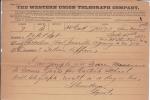
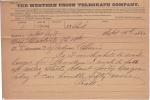
Richard Henry Pratt inquires whether it is worthwhile to wait for William H. H. Llewellyn to recruit girls from the Mescalero Agency. Notes that L. J. Miles is going to leave the Osage Agency with 40 students and he can accept 50 more from that agency.
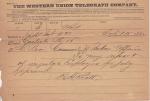
Richard Henry Pratt follows up by telegram to the Office of Indian Affairs asking if his Report of Irregular Employees for July 1884 is approved.
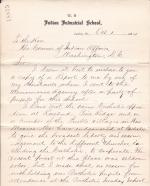
Marianna Burgess sends a report to Richard Henry Pratt regarding a recruiting trip at the Menominee Agency. Burgess details the difficulties resulting from opposition from the local Catholic Priest. Pratt notes that he has experienced similar opposition at the Rosebud, Pine Ridge, and in a number of the Pueblo Agencies.
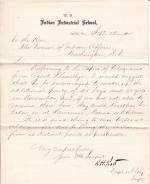
Richard Henry Pratt references the telegrams sent by William H. H. Llewellyn, U.S. Indian Agent for the Mescalero Agency, and recommends that the agent be encouraged to make up the party of students from the agency in November. He notes that if Carlisle is unable to enroll the students that they can likely be sent to another Indian School.
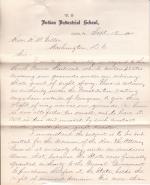
Richard Henry Pratt writes the Bureau of Indian Affairs regarding a proposed plan of the South Pennsylvania Railroad to use eminent domain through the state to build a railroad through the grounds of the Carlisle Indian School. Pratt notes that this would greatly diminish the capability of the school to properly educate students.

Request from the Cheyenne Agency for 80 children as well as 10 chiefs and police to visit the Carlisle Indian School.
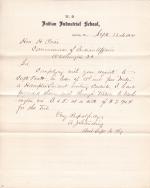
Alfred John Standing informs the Commissioner of Indian Affairs that he has provided a ticket for Miles, a Hampton Institute student, to visit the Carlisle Indian School.
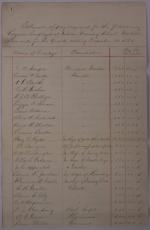
Estimate of funds for the fourth quarter of 1884 amounting to $14,921.50 for support of the school. Richard H. Pratt also requests additional funds amounting to $6,105.00 for regular employee pay and includes a lengthy letter asking for $6,000.00 to purchase lumber for dining room building.
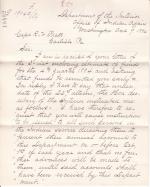
Correspondence regarding a request of Richard Henry Pratt to have funds for building a new dining room to be sent to him.
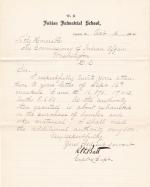
Richard Henry Pratt informs the Office of Indian Affairs that his previous authority for purchasing lumber and other materials is nearly exhausted and he will need an additional authority soon.
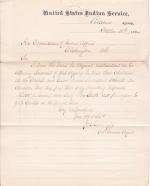
James G. Wright, U.S. Indian Agent for the Rosebud Agency, requests instructions for allowing Cook and Two Strike to visit their children at the Genoa and Carlisle Indian Schools. Both propose to pay their way and a note attached to the letter indicates there is no objection as long as Pratt agrees and there is no Government expense.
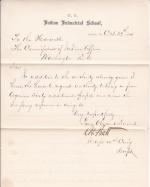
Richard Henry Pratt requests authority to bring in an additional 60 students from various agencies.
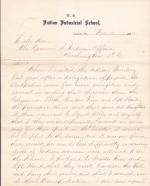
Richard Henry Pratt requests permission to allow two Arapaho Chiefs, Powder Face and Left Hand, as well as their wives to visit the Carlisle Indian School in the hopes of making it easier to allow families to send girls to the school by having women visit. In addition, Pratt proposes allowing two Cheyenne chiefs and their wives visit for the…
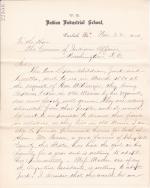
Richard Henry Pratt proposes to two families to adopt Kisetta and Jack, members of the Apache Nation. Pratt indicates that Kisetta be adopted by Mr. Paxon a farmer who she has been living with on outing and Jack by Miss Mather, a former St. Augustine assistant.

Richard Henry Pratt asks if anything has been done about his previous letter about school stationery.
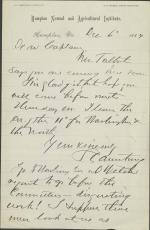
Samuel Chapman Armstrong of the Hampton Institute writes to Richard Henry Pratt discussing the timing of a possible visit of Pratt to Hampton, to work with Armstrong's upcoming travel plans to Washington and the North. Armstrong notes that his Washington trip is meant to deal with a recent report to go in front of a Congressional committee.
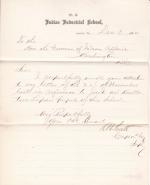
Richard Henry Pratt calls to the attention of the Commissioner of Indian Affairs his previous letter proposing the adoptions of Kisetta and Jack, members of the Apache Nation, to Mr. Paxon a farmer in Schuylkill County, Pennsylvania and Miss Mather, one of his former assistants at St. Augustine.
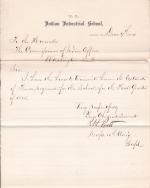
Estimate of funds for the first quarter of 1885 amounting to $7,872.50 for support of the school. Richard H. Pratt also requests additional funds amounting to $6,105.00 for regular employee pay.
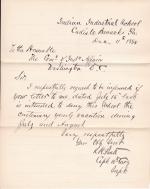
Richard Henry Pratt inquires if an Office of Indian Affairs letter is meant to deny the Carlisle Indian School its yearly vacation during the Summer.
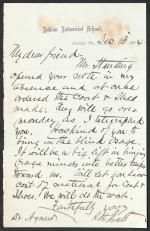
Superintendent Richard Henry Pratt writes to Doctor Cornelius Rea Agnew regarding his order of a coat and shoes from the school. Pratt also commends Agnew for taking in a blind Osage child. Transcript included.
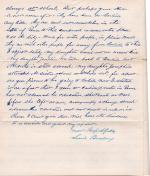
Louis Bourdeaux requests that his daughters Josephine and Martha be transferred from the Carlisle Indian School to Avoca. Bourdeaux writes that due to the outing program his daughters have rarely been at Carlisle and have instead been servants in various homes throughout Pennsylvania and so has not advanced her education.
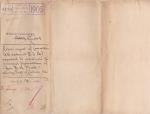
This audit and report, which concerns the finances of the Carlisle Indian School as administered by Richard Henry Pratt, was prepared immediately following his retirement as superintendent of the school. The report focuses on the use of non-governmental funds - charitable donations to the school, as well as income earned through athletics and…
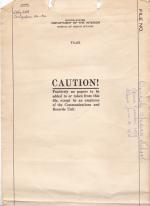
This material is a collection of correspondence received by the Office of Indian Affairs between 1918 and 1966, all related to the Carlisle Indian School. As the Carlisle Indian School closed in 1918, the majority of these letters are either requesting information about the school and its graduates, or inquiring to see if the school is still…
